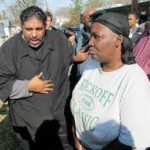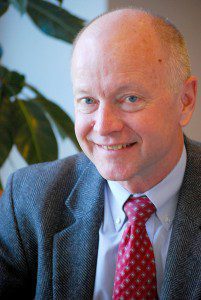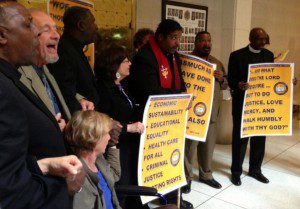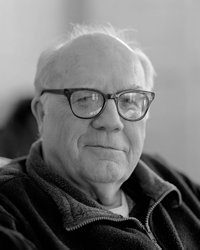In Rocky Mount, North Carolina, at an Opportunity Industrial Center (OIC) on the east side of town, an auditorium is bustling with activity on a Saturday morning. I’m greeted at the door by a friendly church deacon who offers my kids donuts and points me toward the coffee. Over the PA system, I hear the booming voice of Rev. William Barber, one of North Carolina’s best preachers and the tireless president of our state NAACP branch. I’m here because Rev. Barber told me to come. When Rev. Barber calls, I listen.
 Rev. Barber is giving a report on the Poverty and Hope Tour that the NAACP has co-sponsored with the UNC’s Center on Poverty, Work, and Opportunity. Together with a team of researchers, journalists, and citizen-observers, Rev. Barber visited 22 of North Carolina’s poorest communities. The academics already had the numbers to show that we’re suffering a job deficit of half a million jobs in this state, that today’s poverty rate is the same as in 1969, that American-Indians, Latinos, and African-Americans in North Carolina earn, on average, $15,000 less than whites. But they wanted to meet Richard Monroe, a 65 year-old veteran who lives under a bridge in Fayetteville. They wanted to talk to the kids in Navassa, NC, a town so poor that it can’t afford the staff to keep its paperwork up to date. Living amongst the refuse of industrial waste, the black children hold signs that say, “Clean Up Our Future” and “Why Was My Neighborhood a Dumping Ground?” They wanted to listen to mobile home residents in Eastern North Carolina whose electricity bills are three times their rent.
Rev. Barber is giving a report on the Poverty and Hope Tour that the NAACP has co-sponsored with the UNC’s Center on Poverty, Work, and Opportunity. Together with a team of researchers, journalists, and citizen-observers, Rev. Barber visited 22 of North Carolina’s poorest communities. The academics already had the numbers to show that we’re suffering a job deficit of half a million jobs in this state, that today’s poverty rate is the same as in 1969, that American-Indians, Latinos, and African-Americans in North Carolina earn, on average, $15,000 less than whites. But they wanted to meet Richard Monroe, a 65 year-old veteran who lives under a bridge in Fayetteville. They wanted to talk to the kids in Navassa, NC, a town so poor that it can’t afford the staff to keep its paperwork up to date. Living amongst the refuse of industrial waste, the black children hold signs that say, “Clean Up Our Future” and “Why Was My Neighborhood a Dumping Ground?” They wanted to listen to mobile home residents in Eastern North Carolina whose electricity bills are three times their rent.
What they heard and saw was deeply disturbing. But it was also, for a Christian preacher in the prophetic tradition of Martin Luther King, stirring. I quote Rev. Barber:
One day on the tour we came to Hickory, North Carolina. We were invited to walk down a path into the woods. We were confronted with the fresh reality of man’s inhumanity to man. As we walked along the path we saw baby dolls and toys, eerie signs that there were children amidst all our affluence, amidst all our wealth, amidst all our national claim to be one nation, there were children living under and beneath the trees and brushes of the woods like animals.
When we got to the community in the middle of the woods, we met God’s family — black, brown and white; male and female.
I was brought to uncontrollable tears when our new friends welcomed us. They swept the dirt and made space for us among the grass and the weeds. They told us of how often the authorities would come out to their small community and run them out of the woods because the city did not want to acknowledge its level of devastating poverty.
And yet, in that same city, like so many other places, politicians open their meetings with prayers unto God. Good church folk come to service and ask God for more personal abundance and more personal prayers. Standing in those woods it seems like I heard God saying,
You want to know why it is you fast and I don’t look your way?
You humble yourselves and I don’t even notice?
Well, here’s why:
The bottom line on your ‘fast days’ is profit.
You drive your employees much too hard.
You fast, but at the same time you bicker and fight
You fast, but you swing a mean fist.
The kind of fasting you do won’t get your prayers off the ground.
Do you think this is the kind of fast day I’m after: a day to show off humility?
To put on a pious long face and parade around solemnly in black?
Do you call that fasting, a fast day that I, God, would like?
This is the kind of fast day I’m after: to break the chains of injustice,
Get rid of exploitation in the workplace, free the oppressed,
Cancel debts.
(Isaiah 58:3-9)
In his new book American Dream 2.0: A Christian Way Out of the Great Recession, Frank A Thomas shares his hope for an “uprising of ordinary American citizens, particularly pastors, their congregations and all people of good will, to reclaim the American Dream.” What Thomas is praying for is more than a dream. It is a reality in an OIC Center in Rocky Mount, NC, where over a hundred black and white folks gathered on a Saturday morning to hear what’s really happening to their neighbors and to plan what they can go about it on both the local and national level.
What Thomas shows in this study is how a citizen-activist like Rev. Barber is deeply rooted in a tradition of preaching called the “jeremiad,” which has taken different forms in this nation’s history. King employed this form when he gave his famous “I Have a Dream” speech, calling America to live up to its promises and make good on a check that had come back marked “insufficient funds.” But he also engaged this form in his “Beyond Vietnam” speech that alienated so many, including some of King’s closest advisers. Through a careful reading of King, Jeremiah Wright, and President Obama, Thomas shows how this tradition has been appropriated at different times in this nation’s history.
Though careful scholarship is at the heart of this book, Thomas means to tell a story that the reader does not simply engage as observer but gets caught up in as an activist. This is why I’m excited about what he’s doing. Because the everyday awakening that I’ve been chronicling here–the God Movement that is manifest in the day-to-day actions of thousands of people who are pursuing justice in their local communities–needs scholars like Thomas who show us what streams we need to drink from if we’re going to survive in this country. The answer, in short, is black prophetic preaching.
If you’re white, like me, you may not immediately understand why this is so. Thankfully, Frank A. Thomas has written a book to explain it and to help you share the news with your friends. Listen to this man. He’s tracing the history that points to the best future for all of us.
 This post is part of a round table discussion at the Patheos Book Club. Check it out for an excerpt, an interview with Thomas, and others’ take on the book.
This post is part of a round table discussion at the Patheos Book Club. Check it out for an excerpt, an interview with Thomas, and others’ take on the book.











